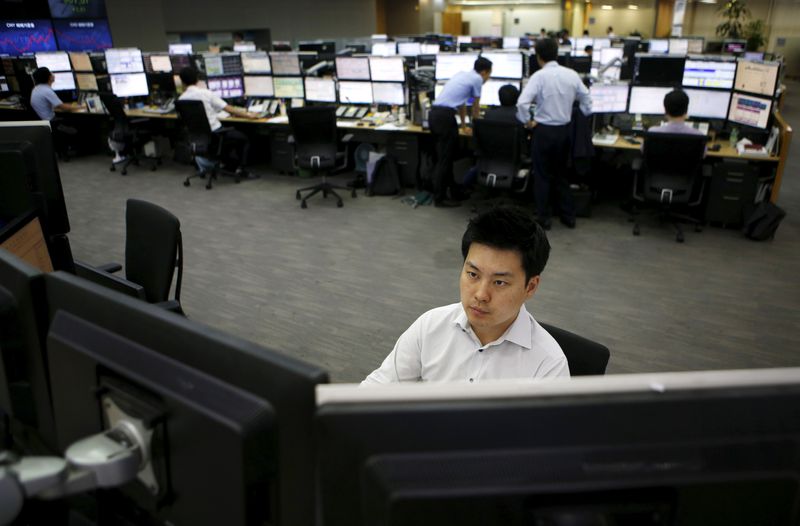By Harish Sridharan
(Reuters) - Global banks are turning bullish on South Korean and Taiwanese shares, expecting a revival in semiconductors to drive a rally next year, while they see Japan's market as resilient thanks in part to its weak currency.
The calls come as U.S. rates are still rising, with most markets around the world eyeing their worst annual returns since the 2008 global financial crisis and with chipmakers' profits cratering.
Goldman Sachs (NYSE:GS) says South Korean stocks are the bank's top "rebound candidate" for 2023 due to low valuations, made cheaper by a nosediving Korean won, and as companies benefit from an expected recovery in Chinese demand. It expects a 2023 return in dollar terms of 30%.
Morgan Stanley (NYSE:MS) also gives Korea top billing. Together with Taiwan, it is the best place to be, says the bank, as the two markets have a reputation as "early-cycle" leaders in the demand recovery.
Bank of America (NYSE:BAC), UBS, Societe Generale (OTC:SCGLY) and Deutsche Bank (ETR:DBKGn)'s wealth manager DWS are all bullish on Korean stocks, with analysts' conviction in that trade lying in sharp contrast to its divided view on India and China.
"In the semiconductor area, demand should bottom in the first quarter of next year and the market always starts to run before that," said DWS' Asia-Pacific chief investment officer, Sean Taylor, who added Korean exposure in recent months.
"We think (Korean stocks) sold off too much in September and August."
South Korea's benchmark KOSPI index has lost about 17% so far this year and the won has declined 9%, though both have shown signs of recovery in recent months.
Goldman Sachs also noted that five years of selling has driven foreign ownership of Korean stocks to its lowest level since 2009, but inflows of about $6 billion since end-June "indicates a turn in foreign interest" that could lift the market further.
Societe Generale's recommendation for investors to increase their exposure to Korea and Taiwan comes at the expense of China, India and Indonesia. Goldman's preference for Korean stocks comes as it has suggested a reduction in Brazil exposure. Morgan Stanley downgraded its view on Indian exposure in October, when it upgraded its recommendation for South Korea.
Morgan Stanley is most bullish on chipmakers turning out commoditised low-cost chips as well as chips destined for consumer goods - including companies such as Samsung Electronics (OTC:SSNLF) or SK Hynix. Morgan Stanley has a price target for SK Hynix about 50% above the current share price.
RISK-REWARD
Taiwan and Japan offer attractions for some similar and some novel reasons. Like South Korea, Taiwan is another heavily-sold and chip-maker dominated market - though tensions with China make some investors a bit less enthusiastic.
Goldman Sachs is underweight Taiwanese stocks, citing geopolitical risk, while Bank of America is neutral and its most recent survey of Asian fund managers shows they are bearish.
Japan also offers chips exposure as well as some security and diversification, with the weak yen also a tailwind for exporters and typically a boon for equities.
"A sustained stay at such undervalued levels, as expected by our FX strategists, augurs well for Japan equities," said Bank of America analysts, who recommend overweight allocation to Japan. Morgan Stanley, DWS, UBS are also positive, as is Goldman Sachs, especially for the second half when it forecasts inflows.
There is less agreement when it comes to China, where big investors seem to be in a wait-and-see mode, or India where investment houses feel an 8% rally for the benchmark Sensex has left valuations a bit pricey.
To be sure, much of the banks' investment calls rest on assumptions that U.S. interest rates eventually stop going up and China eventually relaxes its COVID rules.
Meanwhile, Taiwan and South Korea are both geopolitical flashpoints - but analysts argue at least some of that is already in the price.

"There has been some political issue in both Korea and Taiwan for a long time," said Societe Generale's head of Asia equity strategy, Frank Benzimra.
"Things can always get worse," he said. "But in terms of the risk-reward, what we find is that a number of the lowly valued markets, whether it's Korea or Taiwan ... have more limited downside because of the accumulation of bad news that we have seen over the last 12 months."